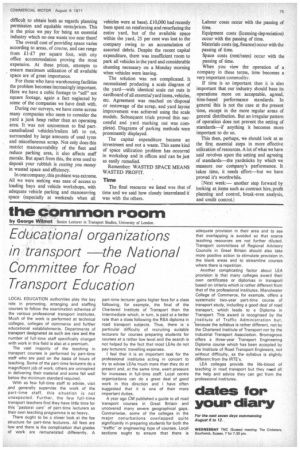the common room Educational organizations in transport the National Committee for Road Transport Education
Page 77

If you've noticed an error in this article please click here to report it so we can fix it.
LOCAL EDUCATION authorities play the key role in promoting, arranging and staffing courses to follow the examination schemes of the various professional transport institutes. Much of the work is performed at technical colleges, colleges of commerce and further educational establishments. Departments of transport designated as such are rare and the number of full-time staff specifically charged with work in this field is also at a premium.
The vast majority of the teaching in transport courses is performed by part-time staff who are paid on the basis of hours of teaching. Some of the part-time lecturers do a magnificent job of work, others are uninspired in delivering their material and some fall well below the minimum standard required.
With so few full-time staff to advise, visit and generally supervise the work of the part-time staff, this situation is not unexpected. Further, the few full-time transport teachers find they have little time for this "pastoral care" of part-time lecturers as their own teaching programme is so heavy.
There ought to be a closer look at the fee structure for part-time lecturers. All fees are low and there is the complication that grades of work are remunerated differently. A part-time lecturer gains higher fees for a class following, for example, the final of the Chartered Institute of Transport than the Intermediate which, in turn, is paid at a better rate than a class following the RSA diploma in road transport subjects. Thus, there is a particular difficulty of recruiting suitable lecturers for courses preparing students for courses at a rather low level and the search is not helped by the fact that most LEAs do not pay lecturers' travelling expenses.
I feel that it is an important task for the professional institutes acting in concert to try to advise LEAs much more than they do at present and, at the same time, exert pressure for increases in full-time staff. Local centre organizations can do a great deal of good work in this direction and I have often suggested that it is one of their more important duties.
A year ago CM published a guide to all road transport courses in Great Britain and uncovered many severe geographical gaps. Contrariwise, some of the colleges in the major conurbations overlapped quite significantly in preparing students for both the "traffic" or engineering type of courses. Local sections ought to ensure that there is adequate provision in their area and to see that overlapping is avoided so that scarce teaching resources are not further diluted. Transport committees of Regional Advisory Councils in Great Britain should also take more positive action to stimulate provision in. the blank areas and to streamline courses where there is repetition.
Another complicating factor about LEA provision is that many colleges award their own certificates or diplomas in transport based on criteria which is rather different from that of the professional institutes. Manchester College of Commerce, for example, offers a systematic two-year part-time course of transport study, including a good deal of road transport, which leads to a Diploma in Transport. This award is recognized by the Institute of Traffic Administration but, 'because the syllabus is rather different, not by the Chartered Institute of Transport nor by the Industrial Transport Association. Bromsgrove offers a three-year Transport Engineering Diploma course which has been accepted by the Institute of Road Transport Engineers, not without difficulty, as the syllabus is slightly different from the IRTE's.
LEA colleges provide the life-blood of teaching in road transport but they need all the help and advice they can get from the professional institutes.




























































































































